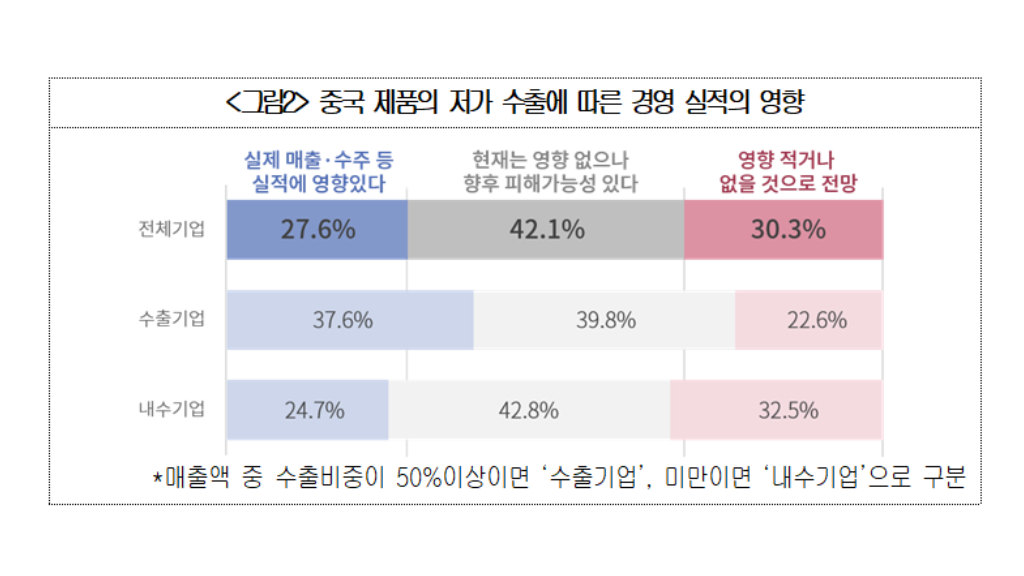대한상공회의소가 6일 공개한 ‘중국산 저가 공세가 국내 제조업에 미치는 영향’ 자료에 따르면, 중국 기업들의 저가 공세가 올해 다시 높아지고 있는 것으로 드러났다.
▲중국 제품의 저가 수출에 따른 경영 실적의 영향 (자료=대한상공회의소)
국내 제조업 약 70%가 피해 영향권
배터리 61% 등…판매단가 하락 피해 가장 커
“4~5년 내 중국 기술력 추월될 수도”
중국이 펼치는 저가 공세로 국내 제조업의 27.6%가 피해를 받고 있는 것으로 나타났다. 국내 기업들은 이에 맞서 고부가 제품 개발 등으로 품질을 높이는 차별화 전략을 채택하고 있다.
그러나 중국의 기술 추격이 가속화됨에 따라 국내 제조업을 보호하는 정책 마련이 시급하다는 여론이 제기되고 있다.
대한상공회의소가 6일 공개한 ‘중국산 저가 공세가 국내 제조업에 미치는 영향’ 자료에 따르면, 중국 기업들의 저가 공세가 올해 다시 높아지고 있는 것으로 드러났다. 이는 중국이 코로나 팬데믹 및 부동산 경기 침체로 늘어난 완제품 재고율이 주된 원인이다.
대한상의가 전국 제조기업 2,228개사를 대상으로 조사한 결과에 따르면, 응답기업의 27.6%가 중국제품의 저가 수출로 인해 “실제 매출·수주 등에 영향이 있다”고 답했고, “현재까지는 영향 없으나 향후 피해가능성이 있다”며 우려를 나타낸 기업도 42.1%에 달했다.
저가 공세로 인한 피해는 ‘판매단가 하락(52.4%)’과 ‘내수시장 거래 감소(46.2%)’가 가장 많았다.
중국의 저가 공세로 인한 피해가 가장 큰 업종은 ‘배터리(61%)’다. 이어 ‘섬유·의류(46%)’, ‘화장품(41%)’, ‘철강(35%)’ 등 순으로 나타났다. 최근 몇 차례 안전 위협 사례 등으로 전기차 수요가 감소한 가운데, 배터리 업종은 이중고를 겪고 있는 셈이다.
예컨대 국내 이차전지의 핵심부품 기업 중 한 곳은 “관세, 품질·안전성 문제로 중국산 원자재 사용을 최소화했으나, 경쟁사들이 값싼 중국산 원자재를 가격을 내려 단가 경쟁에 밀리고 있다”고 말했다.
중국의 저가 공세는 알리, 테무 등과 같은 거대 온라인 플랫폼을 타고 들어와 국내 소비자 권익에 대한 위협도 크다. 글로벌 이커머스 3사의 성장률은 지난 5년간 평균 41%에 달한다. 해외 직구 제품 관련 소비자 민원이 지난 3년간 약 5배 증가했고, 제품 인증 제도가 미흡해 유해물질 검출 제품으로 소비자 안전에 비상이 걸렸다.
국민의힘 강민국 의원은 “중국의 초저가 떨이 제품을 국내에 많이 판매하면 국내 제조업 붕괴를 초래하는 심각한 상황이 올 수 있다”며, “해외 플랫폼 사업자가 국내법을 위반해도 규제할 법적 근거가 없는 가운데, 국민 피해를 최소화하는 제도적 장치를 마련해야 한다”고 주장했다.
중국 기업의 침투는 비단 낮은 가격만이 문제가 아니다. 최근 중국은 미국의 대중 제재에 맞서 자국의 칩 제조 역량을 키우며 기술 추격을 가속화하고 있다.
최근 5년간 중국 경쟁기업과의 기술력 및 품질경쟁력 차이를 묻는 질문에 대해 ‘계속 우위에 있다’고 응답한 기업은 26.2%에 그쳤다. ‘우위에 있으나 기술격차가 축소됐다’는 응답이 47.3%로 2배 가까이 많았다. ‘비슷한 수준까지 추격당했다’고 응답한 기업도 22.5%로 적지 않았고, 이미 ‘중국기업에 추월당했다’(3.0%)는 응답도 있었다.
응답 기업 중 39.5%는 “중국 기업이 향후 4~5년 내 기술 추월을 할 수도 있다”고 예상하기도 했다.
한편 국내 기업들은 중국 저가 공세 대응 전략을 마련하고 있다. 응답 기업 중 46.9%는 ‘고부가 제품 개발 등 품질향상’을 차별화 전략으로 꼽았다. 이어 ‘제품 다변화 등 시장저변 확대’(32.4%), ‘신규 수출시장 개척 및 공략’(25.1%), ‘인건비 등 비용절감’(21.0%), ‘현지생산 등 가격경쟁력 확보’(16.1%) 등을 차례로 답했다. 그러나 ‘대응전략이 없다’는 기업도 14.2%가 있었다.
아울러 정부의 중국 저가 공세로부터 국내 제조업 붕괴를 막을 정책 마련이 시급하다.
국내 기업들은 ‘국내산업 보호조치’(37.4%)를 가장 강구했다. 이어서 ‘연구개발(R&D) 지원 확대’(25.1%), ‘신규시장 개척 지원’(15.9%), ‘무역금융 지원 확대’(12.5%), ‘FTA 활용 지원’(6.3%) 등이 필요하다는 응답이 있었다.
전 세계적으로 자국 산업의 보호주의가 확산되는 가운데 우리도 보다 적극적인 대책 마련이 필요하다는 요구로 보인다. 예컨대 AI·데이터 확보가 국가적 자산으로 부상한 가운데, 글로벌 기업으로부터 데이터 주권 확보를 위한 ‘소버린 AI’가 강조되는 맥락이다.
미국 보호무역주의가 강화될 경우, 중국 내수 경기도 회복도 장기간 지연될 것으로 예측된다. 중국이 밀어내기식 저가 공세가 국내 내수시장뿐만 아니라 해외 수출시장에 끼칠 피해를 막기 위한 조치를 서둘러야 할 때다.
